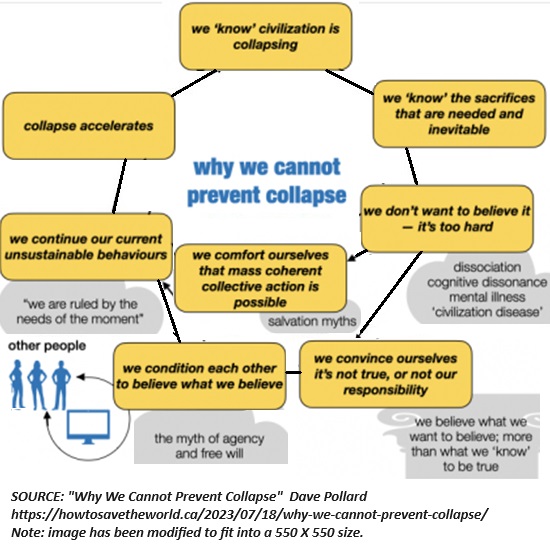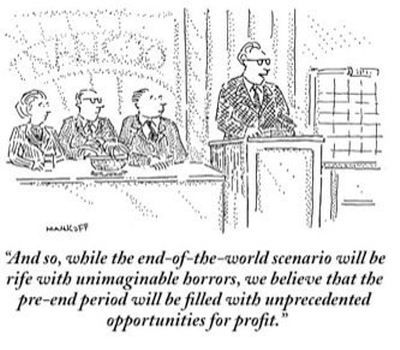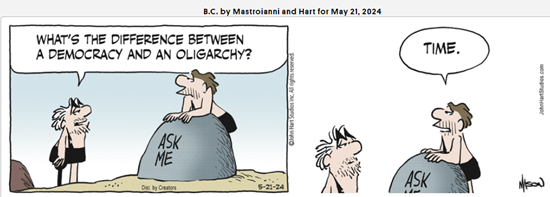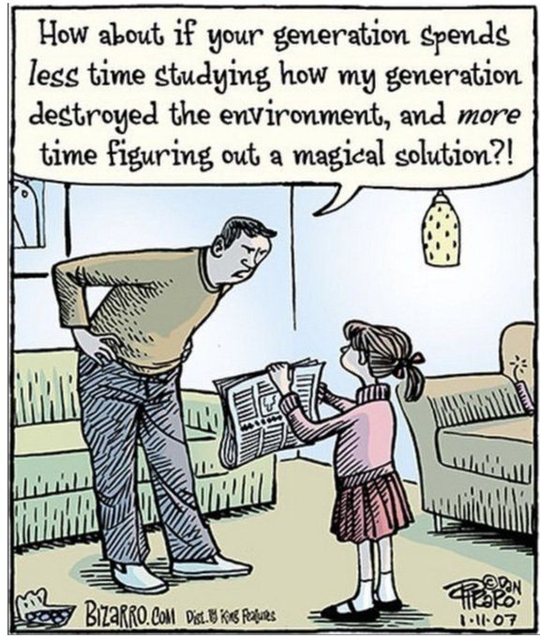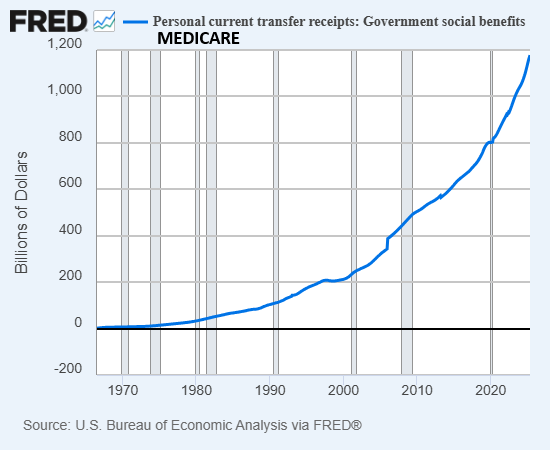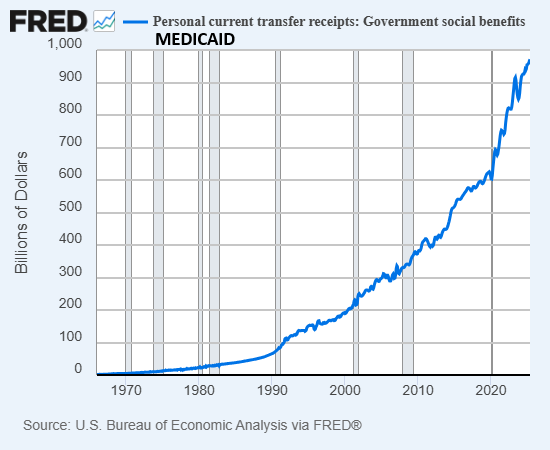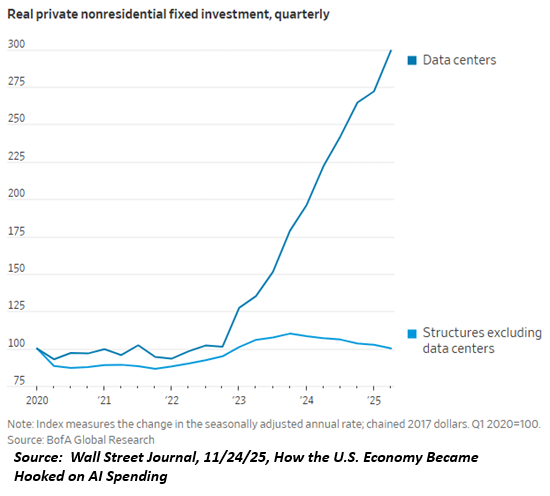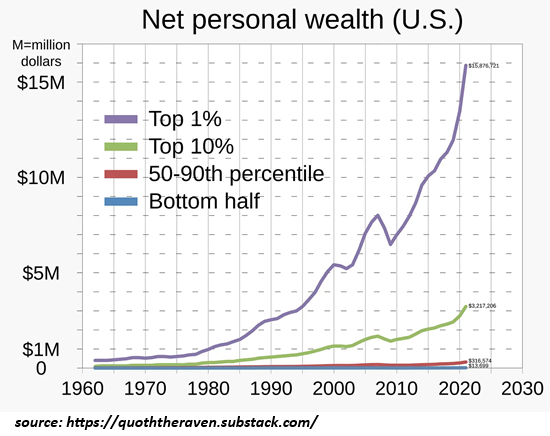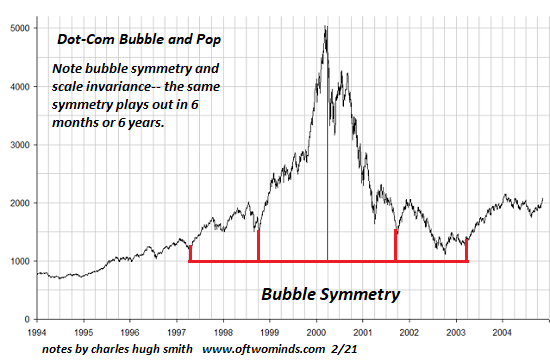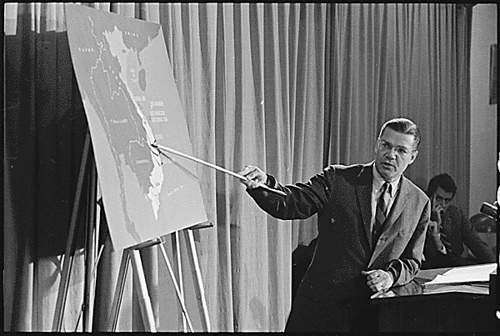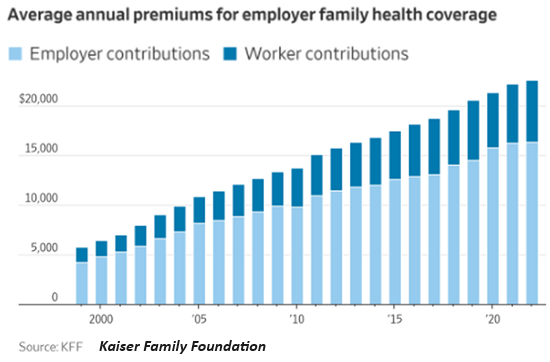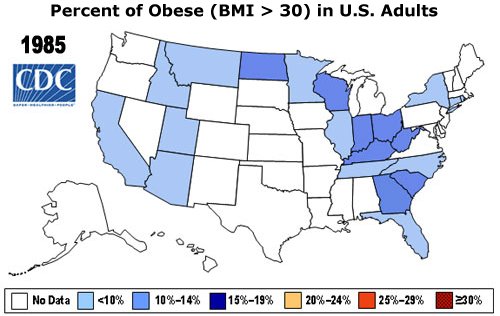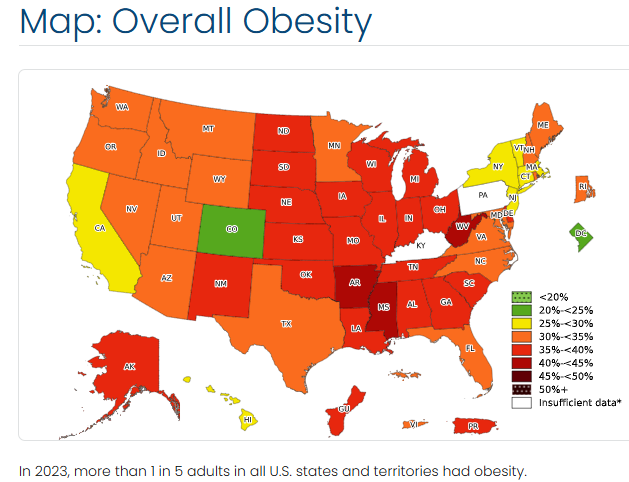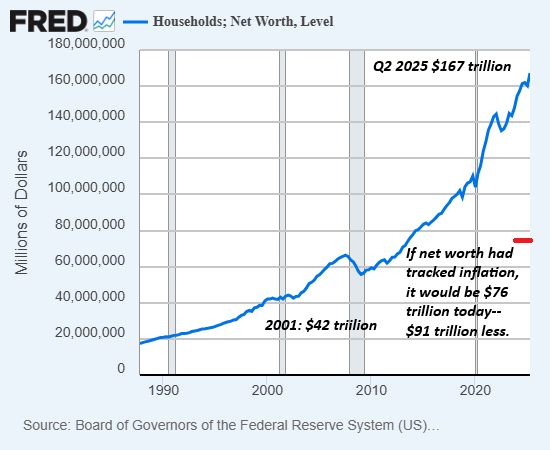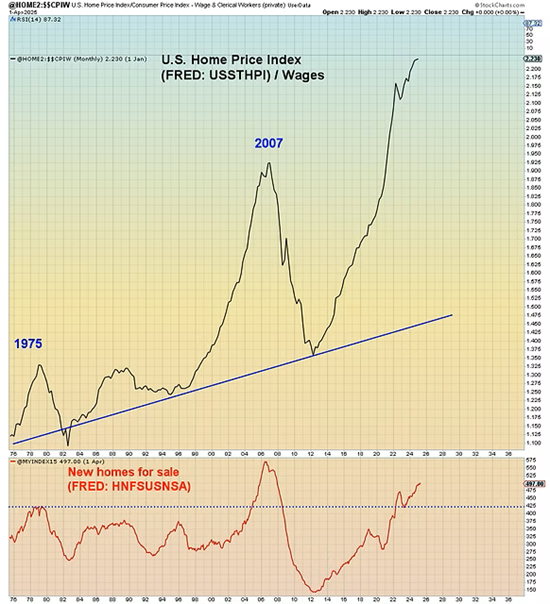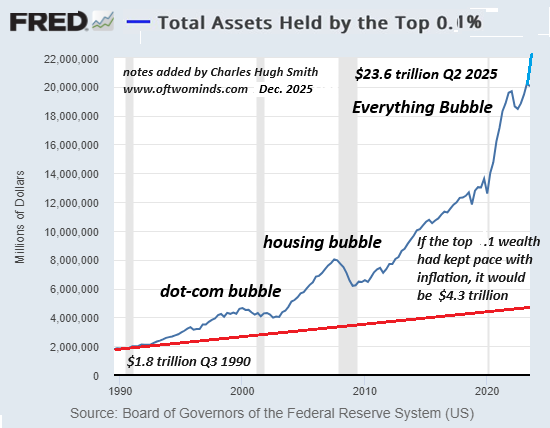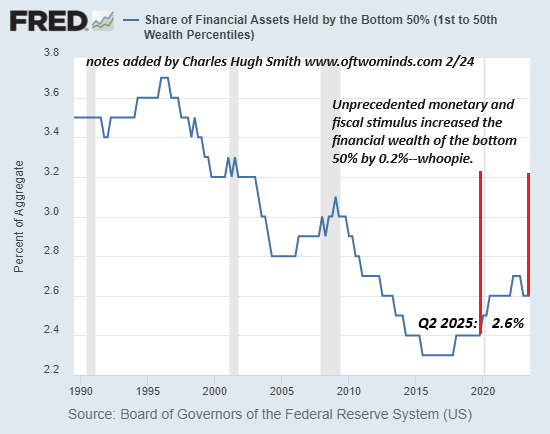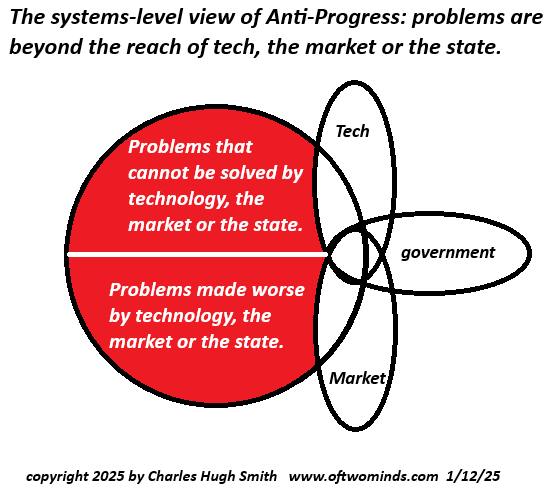The conclusion that soaring asset prices mean the economy is strong is a hallucination that goes unrecognized because the entire financial system is hallucinating.
Consider the data that the financial sector bases conclusions / decisions on (i.e. the data that the financial sector "trains" on) in a Bubble Economy like the present. The Bubble Economy's core goal is to inflate the valuation of assets not by increasing utility-value or productivity but by artificially expanding credit and leverage.
This benefits those who already own assets, as their collateral (i.e. "wealth") expands without any effort, and this swelling collateral enables them to borrow money to buy more assets.
This also benefits those with high incomes and modest debt, as these boost their credit rating, enabling them to borrow at lower rates than the bottom 90% of the workforce--credit they can use to outbid the bottom 90% to snap up assets which are soaring in value.
This Bubble Economy dynamic is a self-reinforcing series of iterations: the central bank expands credit and leverage, goosing asset prices higher, which boosts the collateral foundation for further credit expansion. This flood-tide of credit flows to those whose assets are generating more collateral, enabling them to buy more assets and outbid the less creditworthy while also increasing their consumer spending.
Since the top 10% own most of the assets bubbling higher, this "wealth effect" is concentrated in the top 10%, who account for roughly 50% of all consumer spending.
The Bubble Economy financial system uses this self-referential data to "train" its responses and conclusions. This is analogous to the way that AI systems "train" on data they generated in previous iterations.
This leads to the topic of Model Collapse, the degradation of AI's output (answers) when it starts training on its own curated output rather than raw data.
This then leads to a provocative Unified Theory of Model Collapse (via Tom D.), which posits that model collapse is not limited to AI, it applies equally well to humans, mice and pretty much every other system.
The basic idea is that raw, unadulterated data--"in the wild" data that hasn't been "cooked," curated or massaged--is the foundation of model stability and utility. We can call this authentic data, as it includes outliers, conflicting data points, ambiguous readings and all the messiness of the real world.
Once the "raw" data has been "cooked" (channeling French anthropologist Claude Lévi-Strauss), its authenticity is lost and the "cooked" / curated / processed data is increasingly artificial.
Each iteration of curating / processing data further distances the new output from "raw" / authentic data. Over time, the coherence and meaning of the output is degraded to the point at AI generates hallucinations that are presented as "accurate answers."
This is the dynamic I describe in my book Ultra-Processed Life: the substitution of authenticity with artifice leads to system collapse, not just in the digital realm but in the realm of human experience.
As artifice--data and models drawn from "cooked," curated, massaged, processed sources--replaces "raw" authenticity, entire populations and systems start hallucinating while believing the artificial model is "real." In this state of delusion, they believe their hallucinations are reflecting "the real world": they're blind to the distance between the Ultra-Processed Life they accept as "real" (i.e. "raw") and the actual raw real world.
In this state, the conclusions / answers provided by both AI and humans are hallucinations that are presented as "fact." Those who have lost touch with "raw" real world data then accept these hallucinations as "fact" until the inevitable collision with reality.
The conclusion that soaring asset prices mean the economy is strong and so all is well is a hallucination that goes unrecognized because the entire financial system is hallucinating because it's "training" on artificial data that it generated in a self-referential feedback loop of artificial stimulus and the resulting rise in asset valuations and spending. That none of this stimulus boosted utility value or productivity is left out of the "training," which focuses solely on curated data that supports the hallucination.
Here is how the author of the Unified Theory of Model Collapse describes this process:
"Training on AI-generated data causes models to hallucinate, become delusional, and deviate from reality to the point where they're no longer useful: i.e., Model Collapse.
The more 'poisoned' the data is with artificial content, the more quickly an AI model collapses as minority data is forgotten or lost. The majority of data becomes corrupted, and long-tail statistical data distributions are either ignored or replaced with nonsense.
Those models lose the capacity to understand long-tail information (improbable, but important data) that is no longer represented. Information on topics like serious injuries, getting punched in the nose, how dangerous wild animals can be, and what it's like to truly be hungry because you can't find food. Their models default to synthetic human artifice instead of understanding real implications.

The proposed thesis is that AI models, human minds, larger human cultures, and our furry little friends, all train on available data.
Brains (or brain regions) undergo model collapse just like AI systems. They become unable to reference reality, they become delusional, and hallucinate things that make no sense. Hence, the 'Why do we need farmers when food just comes from the store' level of disconnection observed in urban populations.
In a heavily urban setting, humans train on 'data sets' that are nearly wholly artificial. The less time spent outside, the less time spent interacting with the real physical world around them, the less accurate their model of reality becomes. A rocky slope up a hill may be 100% real, a grass playing field may be 70% real, and a concrete sidewalk may be around 40% real. At some point, however, the 'salted' artificial data is sufficient to corrupt the real-world knowledge of individuals and cause model collapse.
I am reminded of an anecdote from when I was a child. A cousin came to play with my siblings and I. My family had been raised going camping and hiking and wandering the wilds since before I can remember. Somewhere around age 3 or 4, our cousin came to visit and we went cruising up a hill hiking with our fathers in tow.
This cousin, however, had grown up in a suburban hellhole where everything was artificial. As such, he found it nearly impossible to navigate a sloped hill. His experience with walking and running had only ever consisted of flat, soft, curated environments produced by other people. He had no experience, or ability, in navigating a dirt trail at a 20 degree incline. His neurological model of the world was trained on human-produced data, and could not function when confronted with reality.
The universal thesis for model collapse is that advanced modeling systems, when trained on information produced by entities of their own class, lose information fidelity inter-generationally. After multiple generations of training on poisoned datasets, the models themselves become delusional, hallucinate false information, and cease to function.
In the same way that AI models become delusional and hallucinate when too much AI-generated data is in the training dataset, humans also become delusional when too much human-generated data is in their training dataset."
The author then applies this to the famous Mouse Utopia experiment of John Calhoun, in which a handful of breeding-pair mice were put in a large artificial "world" with unlimited food and water and space for 6,000 mice. The researchers anticipated the mice would proliferate to the maximum limit of 6,000 and then experience some version of population overshoot.
But this isn't what happened. The mice population reached 2,200 and then collapsed as anti-social behaviors exploded and reproduction ceased. A wide variety of causal factors have been posited and discussed over the decades since the 1962-72 experiments. The Unified Theory of Model Collapse suggests the core causal mechanism is the mice born in this artificial world of endless abundance "trained" on increasingly artificial data and this disconnect from "raw" real-world experience deranged not just individual mice but the entire society of the artificial world of abundance in a crowded, artificial "urban" environment.
The author suggests the current human population has reached the urban population density (roughly 60% of humanity lives in urban settings) that triggers anti-social behaviors and a rapid decline in fertility / reproduction. Many explanations for the current sharp decline in birth rates in most developed-world economies have been offered, and the Unified Theory of Model Collapse shed important light on the causal mechanisms of artificial environments and abundance.
In my latest book, Investing in Revolution, I explore this irony of abundance: since abundance was only temporary for 99% of humanity's existence, an artificial world of abundance degrades our core survival mechanisms of adaptation to the point that we've lost the capacity to adapt that was kept sharp by scarcity and daily exposure to authentic experiences.
Ultra-Processed Life is artificial because the entire point is to replace messy authentic experiences with convenience and abundance. Just as AI programs cannot differentiate between "facts" and hallucinations, advanced economies /societies cannot recognize or explain their derangement because the implicit goal of Progress is to replace authentic experiences in the "raw" real world with artificial (and highly profitable) convenience and abundance.
The conclusion here is striking: the entirety of the modern world of Progress--urbanized, detached from the "raw" real world in service of convenience and abundance, a world where we "train" our mental models on "cooked," curated, processed artifices--is all a vast, inter-connected, self-reinforcing hallucination bound for a collision with an inconveniently "raw" real world.
The Bubble Economy will be the first point of contact. Prepare accordingly.
AI models collapse when trained on recursively generated data (nature.com)
My new book Investing In Revolution is available at a 10% discount ($18 for the paperback, $24 for the hardcover and $8.95 for the ebook edition).
Introduction (free)
Check out my updated Books and Films.
Become
a $3/month patron of my work via patreon.com
Subscribe to my Substack for free
NOTE: Contributions/subscriptions are acknowledged in the order received. Your name and email
remain confidential and will not be given to any other individual, company or agency.
|
Thank you, Douglas J. ($70), for your magnificently generous subscription
to this site -- I am greatly honored by your support and readership.
|
|
Thank you, Bassam M. ($7/month), for your marvelously generous subscription
to this site -- I am greatly honored by your support and readership.
|
|
Thank you, Herschel R. ($7/month) for your superbly generous subscription
to this site -- I am greatly honored by your support and readership.
|
|
Thank you, Kathryn L. ($7/month), for your splendidly generous subscription
to this site -- I am greatly honored by your support and readership.
|
Read more...
